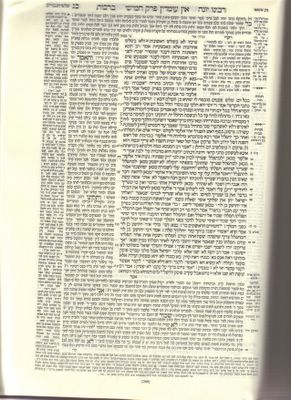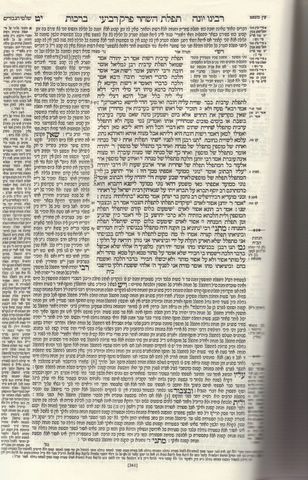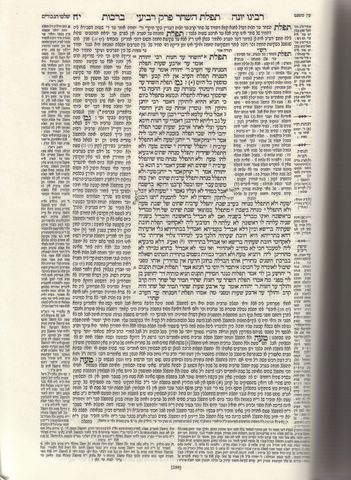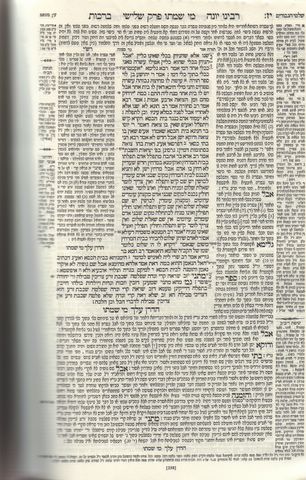
23a
{still discussing the gemara Brachot 31a, but we have digressed to discuss a point in Brachot 34a}
[Rav Yehuda said: A man should never ask for his needs] either in the first three blessings or in the last three, but in the middle ones.
Rav Huna said: The beginning {three} ones are comparable to a servant who arranges his praise before his master; the middle ones are comparable to a servant who is requesting his fare from his master; the final {three} ones are comparable to a servant who receives his fare from his master and takes his leave.
{Brachot 32a}
Rabbi Simlai said: One should always arrange {=recite} his praise of Hashem first and then pray.
From where do we know this? From Moshe, for it is written in Dvarim 3:24:
| כד אֲדֹנָי אלקים, אַתָּה הַחִלּוֹתָ לְהַרְאוֹת אֶת-עַבְדְּךָ, אֶת-גָּדְלְךָ, וְאֶת-יָדְךָ הַחֲזָקָה--אֲשֶׁר מִי-אֵל בַּשָּׁמַיִם וּבָאָרֶץ, אֲשֶׁר-יַעֲשֶׂה כְמַעֲשֶׂיךָ וְכִגְבוּרֹתֶךָ. | 24 'O Lord GOD, Thou hast begun to show Thy servant Thy greatness, and Thy strong hand; for what god is there in heaven or on earth, that can do according to Thy works, and according to Thy mighty acts? |
And we learn in the first perek {of Brachot, daf 4b}: Rabbi Eleazar bar Avina said: whoever says Tehilla LeDavid {= the psalm of Ashrei} three times every day is guaranteed of being a son of {inheriting} the world to come.
And we learn in perek Kol Kitvei Kodesh {Shabbat daf 118b}: Rabbi Yossi said: may my portion be with those who finsh {saying all of} Hallel every day.
Is this so?
But Mar said that one who says Hallel every day is {as if} blaspheming and reproaching {the Divine Name}!
{Rather, } what are we referring to {by Hallel}: Verses of Song {=Psukei DeZimra, called Hallel because of the word Halleluya which appears often.}
{end quote}
And what are they {Psukei DeZimra}?
{From Tehillim 145-150, that is}
From Tehilla LeDavid {=Ashrei} unti Kol HaNeshama Tehallel Kah.
And the Sages instituted to say a blessing beforehand and a blessing afterwards. And what are they? Baruch SheAmar and Yishtabach. Therefore one must not speak from the time he begins Baruch SheAmar until he finishes Shemoneh Esrei.
{Note: From Rabbenu Yona's words, citing Rav Amram Gaon, it is clear that all this - the specifics of Psukei DeZimra, and the blessings, are Geonic. See inside.}
We learn at the end of Rosh HaShana {38a}:
Rabbi Eleazar said: one should always arrange his prayer and then pray.
Rava {our gemara: Rabbi Abba said: Rabbi Eleazar's words are logical as regards Rosh HaShana, Yom Kippur, and prakim*, but the other days of the year, it is not needed.
{Rif based on the gemara}: And how much is prakim? From 30 days and on.
{*Rashi on that gemara defines prakim as Moadim, festivals. The gemara's give and take discussed Rav Yehuda who would arrange his prayer before praying, and explained that since he only prayed infrequently, about once every thirty days, he needed to arrange his prayer in order to remember it, and so it is like prakim. Whereas Rif is taking 30 days and on as the very definition of prakim. Perhaps he had a different girsa.}
{resume Brachot 31a}
Rav Hamnuna said: How many great halachot we can derive from the verses re Scriptures in the story of Chana!
For it is written: (Shmuel I 1:13)
{Same pasuk}
{Same pasuk:}
{Same pasuk}
{pasuk 14:}
| יד וַיֹּאמֶר אֵלֶיהָ עֵלִי, עַד-מָתַי תִּשְׁתַּכָּרִין; הָסִירִי אֶת-יֵינֵךְ, מֵעָלָיִךְ. | 14 And Eli said unto her: 'How long wilt thou be drunken? put away thy wine from thee.' |
{Brachot 31b}
{pasuk 15}
{pasuk 17}
| כו וַתֹּאמֶר בִּי אֲדֹנִי, חֵי נַפְשְׁךָ אֲדֹנִי; אֲנִי הָאִשָּׁה, הַנִּצֶּבֶת עִמְּכָה בָּזֶה, לְהִתְפַּלֵּל, אֶל-ה. | 26 And she said: 'Oh, my lord, as thy soul liveth, my lord, I am the woman that stood by thee here, praying unto the LORD. |
We learn in perek HaDar Im HaNachri BeChatzer {Eruvin 64a}: Rabba bar Rav Huna said: One who has drunk {wine} should not pray, and if he prays, his prayer is a prayer {=valid}. One who is drunk should not pray, and if he prays, his prayer is an abomination.
What is the definition of Shatuy {one who drank}?
And what is the definition of Shikor {one who is drunk}?
A Shatuy one who is able to speak before the king,
A Shikor is unable to speak before the king.
{Brachot 32b}
{The Mishna had said:} "THE PIOUS MEN OF OLD USED TO WAIT AN HOUR"
From where do we know these words?
Rabbi Yehoshua ben Levi said: The Scriptures state (Tehillim 84:5)
| ה אַשְׁרֵי, יוֹשְׁבֵי בֵיתֶךָ-- עוֹד, יְהַלְלוּךָ סֶּלָה. | 5 Happy are they that dwell in Thy house, they are ever praising Thee. Selah |
Before his prayer, from where? {what derivation?}
For it is stated: אַשְׁרֵי, יוֹשְׁבֵי בֵיתֶךָ , עוֹד יְהַלְלוּךָ סֶּלָה ,
After his prayer, from where? (Tehillim 140:14)
| יד אַךְ צַדִּיקִים, יוֹדוּ לִשְׁמֶךָ; יֵשְׁבוּ יְשָׁרִים, אֶת-פָּנֶיךָ. | 14 Surely the righteous shall give thanks unto Thy name; the upright shall dwell in Thy presence. |
{The Mishna had stated:} "EVEN IF A KING GREETS HIM HE SHOULD NOT ANSWER HIM."
Rav Yosef said: They only referred to a Jewish king, but for a non-Jewish king he interrupts.
They posed a contradiction: If he saw a man of violence {or possibly, a donkey} coming toward him; if he saw a wagon coming toward him, he should not interrupt and get out of the way, but should shorten {his prayer} and move.
This is no question - here is where it is possible for him to shorten, and here is where it is impossible to shorten.
If it is possible to shorten, he should shorten, and if not, he should interrupt.
{Brachot 33a}
{The Mishna had said:} "EVEN IF A SNAKE IS WOUND ROUND HIS FOOT HE SHOULD NOT BREAK OFF."
Rav Sheshet said: They only spoke of a snake, but a scorpion, he does break off.
Yerushalmi: What is the reason?
{Rabbi Chuna citing Rabbi Yossi}: For it stings after stinging.














